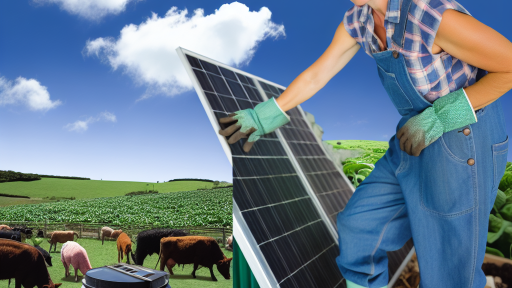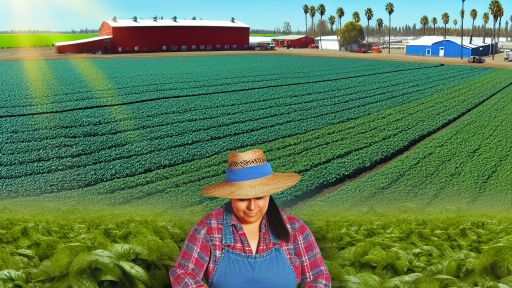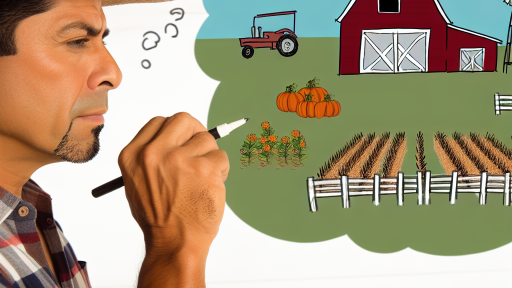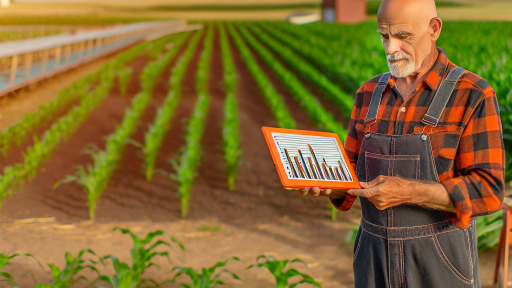Introduction to Sustainable Supply Chain in Agriculture
Sustainable supply chains play a vital role in modern agriculture.
Farmers face growing pressures to adopt more sustainable practices.
This involves not only eco-friendly farming but also efficient logistics.
A sustainable supply chain reduces waste, enhances productivity, and promotes local sourcing.
The Importance of Sustainability
Sustainability helps farmers mitigate environmental impacts.
For example, it encourages soil health through responsible practices.
Additionally, sustainable methods can improve crop yields over time.
Farmers benefit economically by reducing inputs and waste.
Moreover, consumers increasingly demand responsibly sourced products.
Key Strategies for Sustainable Supply Chains
Farmers can adopt various strategies to enhance sustainability.
- Implement crop rotation to improve soil health.
- Use organic fertilizers to reduce chemical runoff.
- Invest in precision agriculture to optimize resources.
- Source materials locally to lower carbon footprints.
- Adopt renewable energy solutions for farming operations.
Technology’s Role
Technology plays a significant role in modernizing supply chains.
Farmers can use drones to monitor crop health effectively.
Moreover, data analytics helps in making informed decisions.
Farm management software streamlines operations and reduces waste.
Blockchain technology can ensure transparency in sourcing.
Transform Your Agribusiness
Unlock your farm's potential with expert advice tailored to your needs. Get actionable steps that drive real results.
Get StartedCollaborative Approaches
Collaboration among stakeholders enhances supply chain sustainability.
Farmers should partner with local businesses and organizations.
Sharing resources and knowledge leads to more effective solutions.
Additionally, joining cooperatives can provide farmers with bargaining power.
This strategy can improve market access and reduce costs.
Challenges to Address
Farmers face certain challenges in implementing sustainable strategies.
Initial investments can be high, which deters some producers.
Market fluctuations and supply chain disruptions can complicate efforts.
Furthermore, education and training are crucial for successful adoption.
Addressing these challenges requires commitment and innovation.
Future Prospects
The future of agriculture lies in sustainable practices.
Embracing these strategies can ensure food security in a changing climate.
As technology advances, solutions will continue to improve.
Farmers play a critical role in shaping a sustainable future.
Ultimately, a collaborative approach enhances resilience in agriculture.
The Importance of Sustainable Supply Chains for Modern Farmers
Understanding Sustainable Supply Chains
Sustainable supply chains focus on minimizing environmental impact.
They prioritize efficient resource use throughout production.
This concept benefits both farmers and the planet.
Consequently, farmers can increase their profitability.
Enhancing Crop Productivity
Adopting sustainable practices boosts crop yields.
By using organic fertilizers, soil health improves significantly.
Moreover, crop rotation encourages biodiversity.
This leads to stronger ecosystems and resilient crops.
Reducing Costs and Waste
Sustainable supply chains help farmers save money.
Showcase Your Farming Business
Publish your professional farming services profile on our blog for a one-time fee of $200 and reach a dedicated audience of farmers and agribusiness owners.
Publish Your ProfileFor instance, reducing waste lowers disposal costs.
Farmers can also find alternative uses for by-products.
This strategy maximizes resources and minimizes waste.
Building Stronger Relationships
Transparency in supply chains fosters trust among partners.
Sustainable practices often lead to long-term agreements.
Farmers can negotiate better prices with reliable partners.
In this way, everyone in the supply chain benefits.
Maintaining Consumer Demand
Today’s consumers prefer sustainably sourced products.
Fulfilling this demand can improve market reach.
Businesses that prioritize sustainability often see increased sales.
Ultimately, aligning with consumer values enhances brand loyalty.
Adapting to Regulatory Changes
Governments are imposing stricter environmental regulations.
Sustainable supply chains ensure compliance with these laws.
Staying ahead of regulations protects farmers from penalties.
By embracing sustainability, farmers can future-proof their operations.
Contributing to a Healthier Environment
Sustainable practices reduce pollution and greenhouse gas emissions.
Moreover, they promote water conservation and soil preservation.
Farmers play a crucial role in combating climate change.
This commitment positively impacts local and global ecosystems.
Key Components of a Sustainable Supply Chain Strategy
Introduction to Sustainable Supply Chains
Sustainable supply chains integrate environmental and social considerations.
Farmers must prioritize these aspects for long-term viability.
Additionally, they enhance their marketability through sustainability practices.
Resource Management
Effective resource management is crucial for sustainable farming.
Farmers should use resources efficiently to reduce waste.
Implementing precision agriculture techniques can optimize resource use.
For instance, utilizing sensors helps in tracking water and fertilizer needs.
This approach lowers costs while supporting environmental goals.
Supplier Collaboration
Building strong relationships with suppliers is essential.
Farmers should seek partners committed to sustainability.
Shared values lead to enhanced collaboration and mutual benefits.
Additionally, farmers can influence suppliers to adopt eco-friendly practices.
Transparency in Operations
Transparency is a key pillar of sustainable supply chains.
Farmers must communicate their practices and sourcing clearly.
Consumers increasingly demand information about product origins.
By being transparent, farmers build trust with their customers.
Alternative Energy Sources
Utilizing alternative energy sources reduces carbon footprints.
Solar and wind power can significantly lower energy costs.
Farmers should consider investing in renewable energy systems.
This investment not only supports sustainability but enhances resilience.
Waste Reduction Techniques
Implementing waste reduction techniques is essential for sustainability.
Showcase Your Farming Business
Publish your professional farming services profile on our blog for a one-time fee of $200 and reach a dedicated audience of farmers and agribusiness owners.
Publish Your ProfileFarmers can use composting to recycle organic waste.
Additionally, they should minimize packaging materials to reduce landfill use.
These steps contribute to a more circular economy in agriculture.
Community Involvement
Engaging with the local community strengthens supply chains.
Farmers should participate in local sustainability initiatives.
This involvement fosters collaboration and enhances local economies.
Moreover, it helps improve community resilience against climate change.
Continuous Improvement
Farmers must adopt a mindset of continuous improvement.
They should regularly evaluate and refine their practices.
Innovation plays a vital role in advancing sustainability.
By staying informed, farmers can implement the latest technologies and methods.
Gain More Insights: Protect Your Farm: Top Risk Management Tips
Assessing and Reducing Environmental Impact in Farming Practices
Understanding Environmental Impact
Farmers face numerous challenges related to environmental impact.
Assessing the effects of farming practices is crucial for sustainable agriculture.
Environmental impact includes soil degradation, water use, and biodiversity loss.
Farmers must evaluate how their actions affect the local ecosystem.
Moreover, understanding the carbon footprint of farming operations is essential.
Strategies for Assessment
Farmers can utilize tools such as soil testing and water monitoring.
These tools provide data to assess the health of the farm’s ecosystem.
Regular assessments help identify areas for improvement and change.
Additionally, adopting technology can streamline this assessment process.
For example, precision agriculture minimizes waste and optimizes input usage.
Implementing Sustainable Practices
Farmers should adopt crop rotation to enhance soil fertility.
This technique reduces soil erosion and promotes biodiversity.
Cover cropping is another effective method to prevent soil depletion.
Furthermore, integrating livestock can help cycle nutrients naturally.
By rotating crops and integrating livestock, farmers enhance ecosystem health.
Water Conservation Techniques
Effective water management practices are critical in reducing environmental impact.
Irrigation techniques such as drip irrigation save water and reduce runoff.
Farmers can also implement rainwater harvesting systems to conserve resources.
By monitoring irrigation schedules, they can further minimize water waste.
Incorporating drought-resistant crops also aids in sustainable water usage.
Monitoring Progress
Regularly tracking environmental impact promotes accountability.
Farmers should establish key performance indicators to measure success.
For instance, tracking changes in soil health can illustrate progress.
Periodic reviews allow farmers to adjust strategies as needed.
Transparency in practices also fosters community trust and support.
Engaging with the Community
Farmers should involve local communities in sustainability efforts.
Engagement fosters shared knowledge and resources for sustainable practices.
Collaborative efforts often yield better outcomes for the environment.
Showcase Your Farming Business
Publish your professional farming services profile on our blog for a one-time fee of $200 and reach a dedicated audience of farmers and agribusiness owners.
Publish Your ProfileBy hosting workshops, farmers can educate the community about sustainable methods.
Moreover, community support can assist in broader environmental initiatives.
See Related Content: Sustainable Livestock Farming Practices for Environmental Stewardship
Innovative Technologies Enhancing Sustainable Supply Chains
Precision Agriculture
Precision agriculture optimizes field-level management regarding crop farming.
It utilizes technology to monitor and manage field variability.
This approach enhances crop yield while minimizing resource use.
Farmers can apply water and fertilizers more efficiently.
Additionally, they can reduce waste significantly.
Blockchain Technology
Blockchain technology increases transparency in supply chains.
It allows for real-time tracking of products from farm to table.
This transparency builds trust between farmers and consumers.
Moreover, it helps identify inefficiencies in the supply chain.
Farmers can reduce costs and improve sustainability.
Drones and Aerial Imaging
Drones enhance monitoring capabilities in agriculture.
They provide aerial imaging for assessing crop health.
Farmers can identify issues before they become severe.
This proactive approach increases crop resilience.
Ultimately, it supports sustainable farming practices.
IoT and Smart Sensors
The Internet of Things (IoT) transforms data collection in agriculture.
Smart sensors monitor soil moisture and nutrient levels.
They provide real-time information to farmers.
This data-driven approach allows for tailored farming practices.
As a result, it leads to better resource management.
Renewable Energy Solutions
Renewable energy sources power sustainable farming operations.
Solar panels and wind turbines reduce dependence on fossil fuels.
Farmers can cut energy costs while minimizing their carbon footprint.
This shift supports a resilient and eco-friendly agricultural sector.
Furthermore, it promotes energy independence in rural areas.
See Related Content: Comprehensive Tax Planning Strategies For Farmers And Agribusinesses
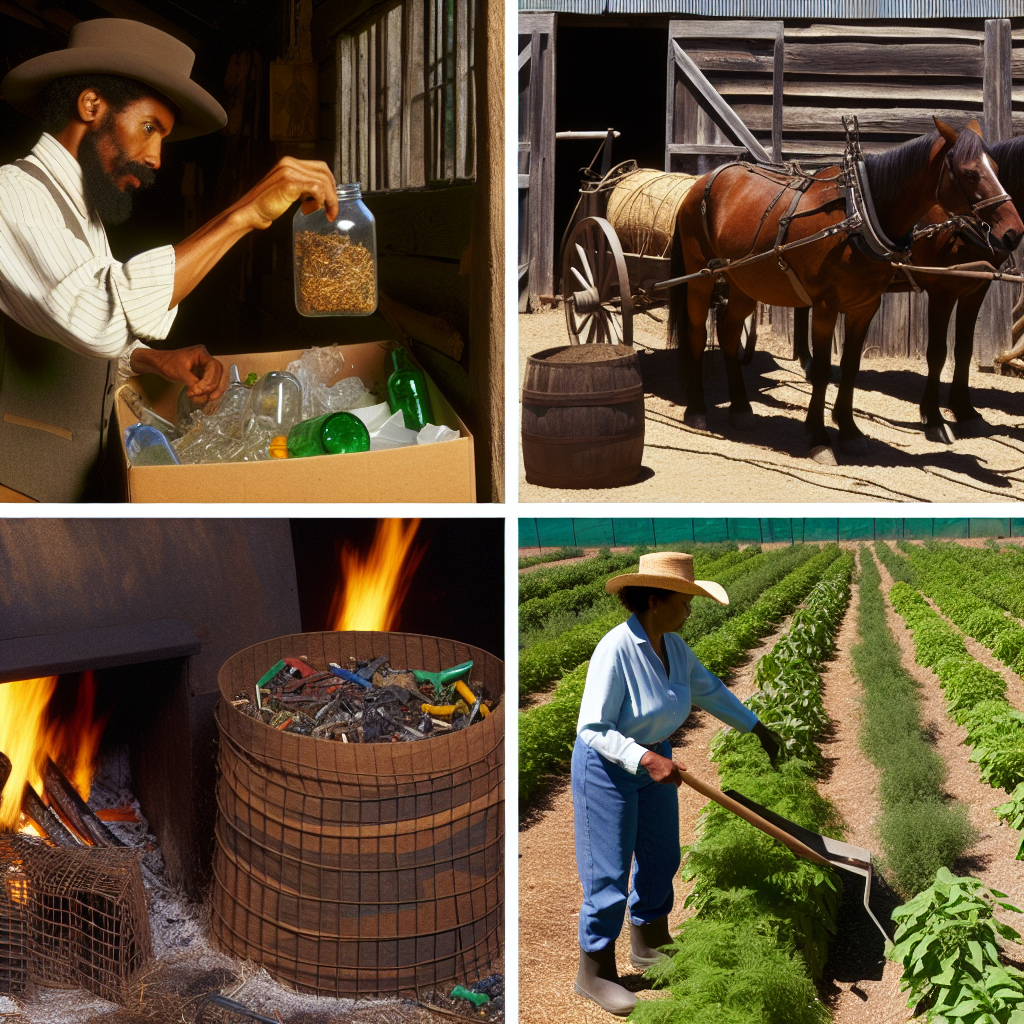
Case Studies: Successful Sustainable Supply Chain Implementations
Green Harvest Co.
Green Harvest Co. transformed its supply chain in 2021.
They implemented composting to reduce waste across operations.
This strategy reduced disposal costs significantly.
In addition, it improved soil health for the farms they supported.
The results led to enhanced crop yields that boosted profits.
Eco Farms Alliance
Eco Farms Alliance adopted a local sourcing program.
This program connects local farmers with regional markets.
As a result, transportation emissions decreased significantly.
Consumers appreciated fresher produce from nearby farms.
Furthermore, this boosted local economies by fostering community relations.
AgriTech Innovations
AgriTech Innovations integrated technology into their supply chains.
Showcase Your Farming Business
Publish your professional farming services profile on our blog for a one-time fee of $200 and reach a dedicated audience of farmers and agribusiness owners.
Publish Your ProfileThey utilized blockchain to track produce from farm to table.
This transparency cultivated consumer trust in their products.
Moreover, it minimized food waste by improving inventory management.
The company experienced increased customer loyalty due to these efforts.
Sustainable Dairy Producers
Sustainable Dairy Producers partnered with renewable energy firms.
They transitioned to solar power across their facilities.
This change led to substantial cost savings on energy bills.
Additionally, it reduced their carbon footprint and enhanced sustainability.
Consequently, they attracted environmentally conscious consumers.
Farm Fresh Collective
Farm Fresh Collective launched a subscription box service.
This service highlights seasonal and organic produce from local farms.
By reducing intermediaries, they lowered costs for consumers.
Customers enjoy knowing their food supports local farmers.
This model has increased profits for all involved parties.
Delve into the Subject: Choosing the Best Insurance for Your Farm
Collaboration and Partnerships in Sustainable Agriculture
The Importance of Collaboration
Collaboration enhances sustainable practices in agriculture.
It brings farmers together to share resources and knowledge.
Additionally, partnerships can lead to innovative solutions.
Building Strong Partnerships
Farmers should seek local businesses for partnerships.
This may include restaurants, retailers, and supply companies.
Such alliances can strengthen local economies and promote sustainability.
Examples of Successful Collaborations
Many farmers have successfully partnered with community organizations.
For instance, Green Valley Farms collaborated with EcoFood Co-op.
They created a local food network that benefits both parties.
Similarly, Ridgeview Orchards joined with local schools.
This partnership promotes agricultural education and fresh produce sales.
Leveraging Technology for Collaboration
Technology plays a vital role in modern agricultural partnerships.
Farm management software enhances communication among partners.
This technology enables shared data and efficient resource management.
Furthermore, online platforms connect farmers to broader markets.
The Role of Nonprofits and Government
Nonprofits often assist farmers in forming effective partnerships.
They provide resources and expertise for sustainable practices.
Government programs can also offer grants to support collaborations.
These initiatives help strengthen the agricultural community.
Challenges in Collaboration
Despite benefits, collaborations may face challenges.
Cultural differences and varied goals can create conflicts.
Effective communication is essential in overcoming these hurdles.
Establishing clear expectations also helps avoid misunderstandings.
The Future of Collaborative Agriculture
The future of agriculture relies on successful collaborations.
As sustainability becomes a priority, partnerships will grow.
Showcase Your Farming Business
Publish your professional farming services profile on our blog for a one-time fee of $200 and reach a dedicated audience of farmers and agribusiness owners.
Publish Your ProfileThis shift benefits not only farmers but also the entire ecosystem.
Future Trends in Sustainable Supply Chain Management for Farmers
Embracing Technology
Farmers are increasingly adopting advanced technologies to enhance sustainability.
These technologies include precision agriculture tools and IoT devices.
Moreover, drones assist in monitoring crops more efficiently.
This technological integration boosts yields while conserving resources.
Strengthening Local Supply Chains
Local sourcing of materials is becoming a significant trend.
Farmers are focusing on collaborating with nearby suppliers.
This approach reduces transportation emissions and costs.
Furthermore, it supports local economies and creates jobs.
Enhancing Transparency
Transparency in supply chains is gaining importance among consumers.
Farmers are adopting practices that allow traceability of products.
This transparency builds consumer trust and loyalty.
Additionally, it enables compliance with emerging regulations.
Prioritizing Sustainable Practices
Sustainable farming techniques are now at the forefront.
Farmers are utilizing organic fertilizers and crop rotation methods.
These practices improve soil health and reduce chemical usage.
As a result, they contribute to more resilient ecosystems.
Integrating Renewable Energy
More farmers are investing in renewable energy solutions.
These include solar panels and wind turbines on farms.
Such initiatives lower energy costs and reduce carbon footprints.
Additionally, they align agricultural practices with eco-friendly goals.
Additional Resources
USDA Agri-Food Supply Chain Assessment: Program and Policy …

